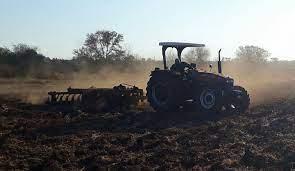Opinion / Columnist
UMVUCHA FARM DEBACLE: Separating facts from fiction
24 Dec 2023 at 13:24hrs |
0 Views

In recent times, social media platforms have become powerful tools for disseminating information and shaping public opinion. Hopewell Chin'ono, a prominent Zimbabwean journalist, has gained significant popularity and a huge audience through his social media presence. However, there have been instances where his influence and reach have been misused, leading to the targeting of individuals without verified evidence. One such case involves Hopewell Chin'ono's accusations against Obert Mpofu, the Secretary General of the ZANU-PF political party, in the ongoing Umvucha Farm dispute. It is important to critically examine the facts and ascertain if Chin'ono's allegations hold merit or if they are based on assumption and speculation.
The Umvucha Farm Incident:
For the past three years, a dispute over Umvucha Farm has been ongoing. The owners of the farm, Troy and Tara Maidwell, have been engaged in a battle concerning the invasion of their property. Hopewell Chin'ono took to social media to shed light on their situation, alleging that thugs associated with Obert Mpofu were harassing the Maidwells and invading their farm. These claims suggest a violation of property rights and insinuate that this incident negatively impacts Zimbabwe's investment climate and global reputation.
The Lack of Fact-Checking:
While it is crucial to address situations of property rights violation and harassment, it is equally important to ensure that allegations are based on verified facts. In this case, Chin'ono failed to fact-check his claims with regards to Obert Mpofu's involvement in the Umvucha Farm dispute. By involving Mpofu without concrete evidence, Chin'ono's allegations may serve to tarnish Mpofu's reputation and create unnecessary hostility.
A Call for Responsible Reporting:
In instances where high-profile individuals with significant audiences speak out against others, it is vital for them to exercise responsible reporting and adhere to the principles of journalism. Hasty accusations can fuel tensions and contribute to a climate of hostility and division. Engaging in respectful and open dialogue, as well as conducting thorough investigations, would lead to more effective resolutions and prevent further damage to the reputation of individuals involved.
Conclusion:
While it is important to give a voice to those who have experienced property rights violations and harassment, it is equally important to ensure that accusations are substantiated before making them public. In the case of Hopewell Chin'ono's allegations against Obert Mpofu, it is essential to establish the truth before accepting or propagating unverified claims. Responsible reporting requires journalists to uphold the highest standards of integrity and rigor in their work, promoting a fair and just society where false accusations do not go unchallenged.
The Umvucha Farm Incident:
For the past three years, a dispute over Umvucha Farm has been ongoing. The owners of the farm, Troy and Tara Maidwell, have been engaged in a battle concerning the invasion of their property. Hopewell Chin'ono took to social media to shed light on their situation, alleging that thugs associated with Obert Mpofu were harassing the Maidwells and invading their farm. These claims suggest a violation of property rights and insinuate that this incident negatively impacts Zimbabwe's investment climate and global reputation.
The Lack of Fact-Checking:
While it is crucial to address situations of property rights violation and harassment, it is equally important to ensure that allegations are based on verified facts. In this case, Chin'ono failed to fact-check his claims with regards to Obert Mpofu's involvement in the Umvucha Farm dispute. By involving Mpofu without concrete evidence, Chin'ono's allegations may serve to tarnish Mpofu's reputation and create unnecessary hostility.
A Call for Responsible Reporting:
In instances where high-profile individuals with significant audiences speak out against others, it is vital for them to exercise responsible reporting and adhere to the principles of journalism. Hasty accusations can fuel tensions and contribute to a climate of hostility and division. Engaging in respectful and open dialogue, as well as conducting thorough investigations, would lead to more effective resolutions and prevent further damage to the reputation of individuals involved.
Conclusion:
While it is important to give a voice to those who have experienced property rights violations and harassment, it is equally important to ensure that accusations are substantiated before making them public. In the case of Hopewell Chin'ono's allegations against Obert Mpofu, it is essential to establish the truth before accepting or propagating unverified claims. Responsible reporting requires journalists to uphold the highest standards of integrity and rigor in their work, promoting a fair and just society where false accusations do not go unchallenged.
Source - Nicholas Ncube
All articles and letters published on Bulawayo24 have been independently written by members of Bulawayo24's community. The views of users published on Bulawayo24 are therefore their own and do not necessarily represent the views of Bulawayo24. Bulawayo24 editors also reserve the right to edit or delete any and all comments received.
Join the discussion
Loading comments…



























